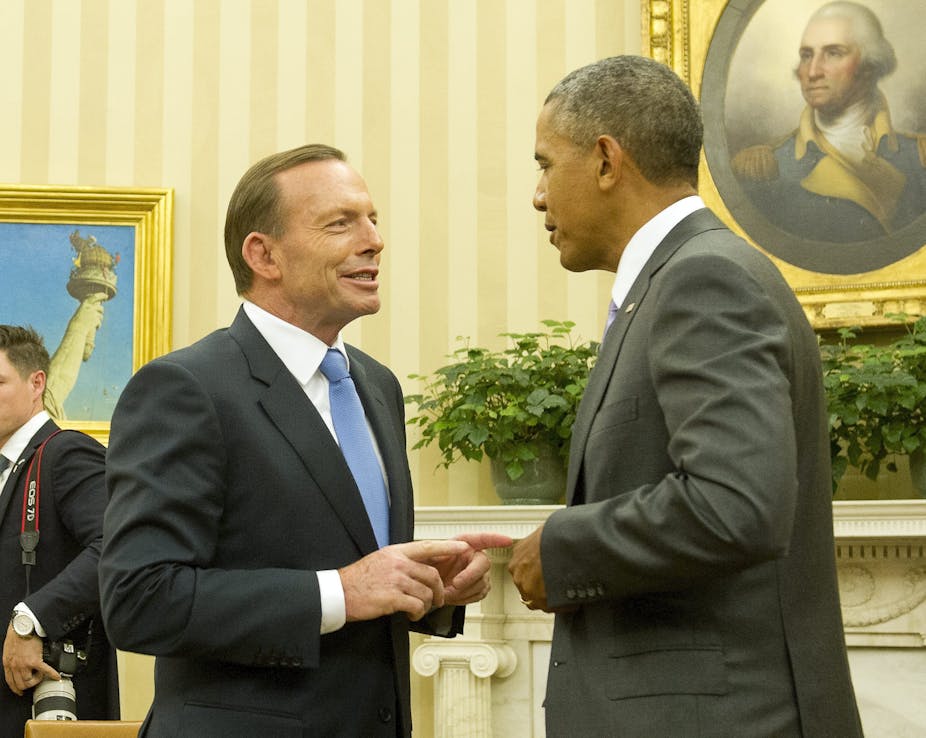Precisely 13 years after the September 11 attacks in New York and Washington that led to the Afghanistan and Iraq engagements, Australia is embroiled in another escalating conflict with an uncertain road map.
Once again an Australian prime minister is joined at the hip with an American president in a mission, just as John Howard was in late 2001 in Afghanistan and in 2003 in Iraq.
There is a contrast in the personal relationships between the Australia and American leaders then and now.
Howard was an ideological soul mate of George W. Bush. And the fact Howard was in Washington on September 11, where the smoke and smell of the Pentagon crash site filled the air, bonded the two in a special way. Their relationship became like that between Harold Holt and Lyndon Johnson in the 1960s Vietnam days.
Abbott has not been a fan of Obama. They are politically poles apart. Shortly before Abbott met Obama in Washington this year, a prime ministerial adviser observed privately that he was the “lamest of lame duck” presidents. Abbott was keen to see Obama act faster on Iraq.
Abbott might have preferred to be operating with someone closer to him politically, but he was always going to put Australia forward for a prominent role in this conflict.
As well as being driven by Australia’s deep relationship with the US – it’s hard to see any Australian government standing apart from the broad coalition being formed – the involvement fits Abbott’s nature.
Obama on Thursday finally detailed his strategy for expanding the efforts against ISIL (the self-styled Islamic State), with the objective of degrading and ultimately destroying it. This involves increasing the US air strikes and extending them into Syria; sending another 475 service members to support Iraqi and Kurdish forced with training, and also providing more assistance to the opposition to ISIL in Syria; putting greater resources into efforts to prevent ISIL attacks, including stemming the flow of foreign fighters into and out of the Middle East; and continuing humanitarian assistance.
Just before Obama’s speech, Abbott said that “a specific request for [Australian] military assistance in the form of air capability, in the form of military advisers could come”. This was code for “a request will be on its way”.
The course these things take is a matter of diplomatic form and military planning. Repeatedly we’re told there is no “specific request”. Behind the scenes the commitment is being worked out, and then there will be the request. All this occurs in the context of a wide coalition being built especially one drawing in Arab countries.
The Super Hornet strike aircraft have been talked about as the air capability, while the military advisers are likely to be trainers from special forces (who have people with good language skills) or the regular army. Trainers would have had experience in Afghanistan.
Both Obama and Abbott have been anxious to distinguish this conflict from the Iraq commitment in 2003. No combat troops on the ground, says Obama repeatedly, enabling Abbott to echo the same.
Bipartisanship makes it easier for Abbott to sell the commitment to the public. Unlike 2003, Labor is supporting the government’s escalation of efforts in Iraq. While some in Labor have their doubts, Shorten can hold the line while there is no dispatch of combat troops on the ground.
It’s interestingly that one of those questioning the Abbott policy is conservative commentator Tom Switzer, from the University of Sydney’s United States Studies Centre.
Switzer recalls that Abbott’s pre-election stance was to an Asia-first approach, and he praises what the PM has done in repairing relations with Indonesia, promoting trade and elevating the India relationship.
He also notes, and endorses, Abbott’s comment during the election campaign, when Kevin Rudd favoured action against Syria, that that conflict was “baddies against baddies”.
Switzer says Abbott’s desire now to be involved in the Middle East – and in the Ukraine too - is wanting to have Australia punch above its weight (adding that as a former boxer the PM should know the perils of that).
“We don’t have a dog in these fights,” he says. Although there is political support for a humanitarian mission in Iraq, Australians have learned previously that things could not be fixed in Iraq, which is a broken state, Switzer says. He argues that when the situation becomes more complicated, the political support will not exist for Australia’s role, which is not in the national interest.
Abbott maintains that the Middle East events are not remote from Australia. “I want to stress that this is at least as much a domestic security issue for us as it is an international security issue,” he said on Thursday. “These conflicts … might be happening a long way away, but they are reaching out to us in the form of people going from Australia to these conflicts and some of them at least coming back to our country.”
Later this month, Abbott will attend the United Nations Security Council meeting that Obama will chair on the issue of foreign fighters (who have included some 60 Australians). The PM said on Thursday that while in New York he would also deliver Australia’s national statement at the UN General Assembly and meet with key leaders ahead of the G20 meeting in Brisbane in November.
There is a parallel here with Kevin Rudd who addressed the General Assembly in September 2008 during another crisis – the global financial one – heightening his profile internationally.
In his speech Obama said that it “will take time to eradicate a cancer like ISIL”. How long this commitment will be is a question that no one can answer. We’ve been in earlier conflicts where America did not have a clear exit strategy. This is going to be another one.

